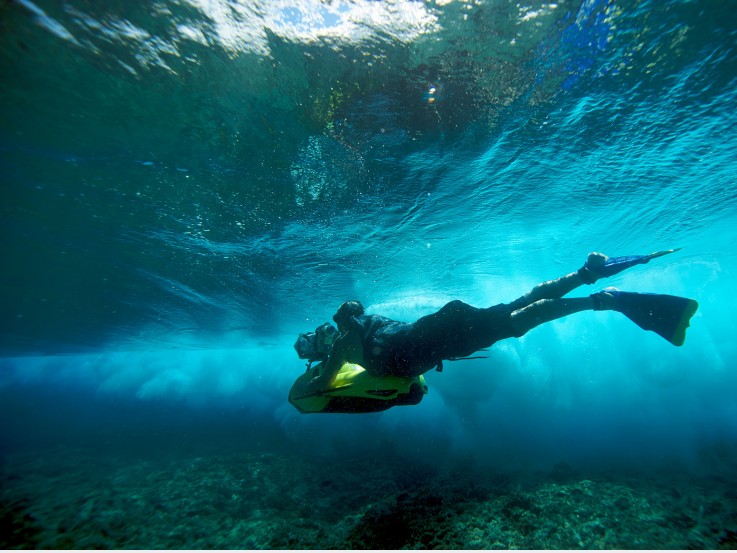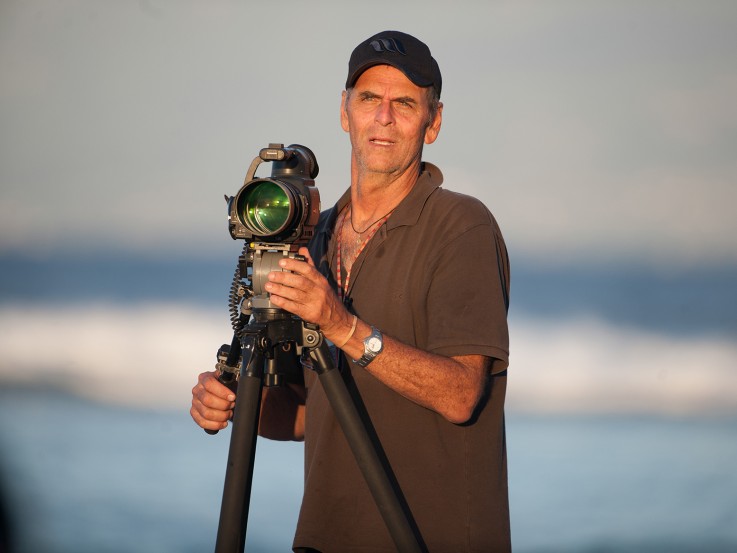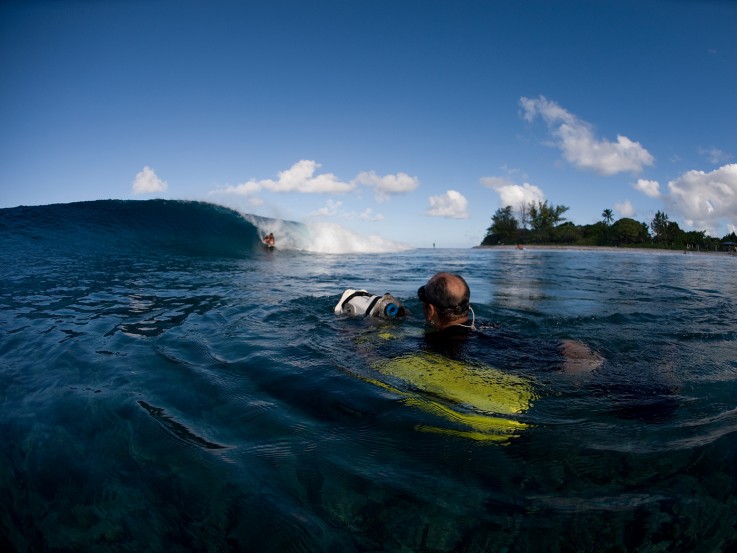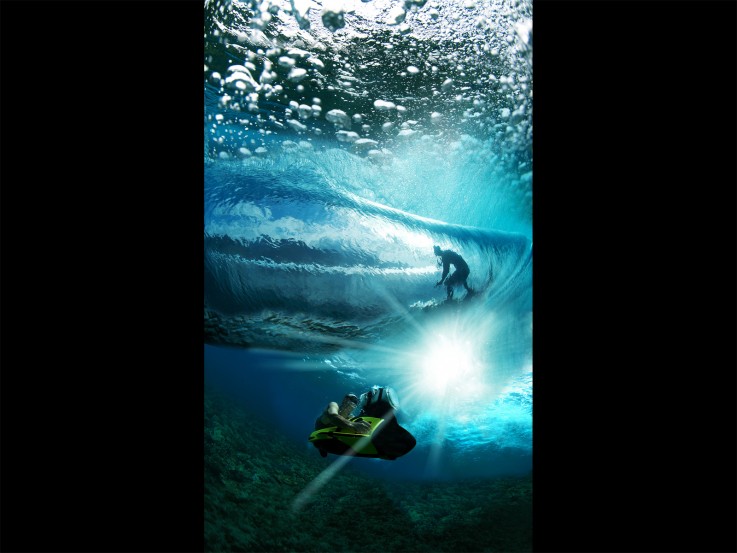Jack McCoy - Surf Cinematographer
How did you get into making surf films? Did you have a specific educational background or just gave it a go?
I started at the school of hard knocks. Starting with film, where it would cost you $50 for every roll and $100 to process it. We roll 100 feet of film, which is less than 3 minutes long. You had to pay that sort of money for it and you had to be very careful how you shot with it and how you did it. If you got your exposures wrong you were stuffed. It was a real heavy learning phase, and you follow focus and you had to set the aperture and you had to do everything yourself. You actually had to have some brains and talent, as far as working the camera to get the result you are after.
Then as time went on, technology took over and today you can get a little old lady that has never seen surfing and set her up on the beach at pipeline and to get her to shoot perfect surf photos. She can go all day long if she wanted to. Hold the button down and let the camera do it all for you. There is no real art or thing other than composition, which is obviously a big part of every photo but the rest of it, the technical side is all taken care of for you.
Did you have someone that mentored you or helped you along the way?
Steve Olson who is a surfing still cinematographer encouraged me initially and taught me a lot. A guy named Spider Wills and Greg Weaver taught me about long lens work. Water photography I was inspired by the people before me like Bud Browne. But these are names that most people wouldn't have a clue about.
Your first film, Tubular Swells, how did that come about?
I had been showing surfing films for many years, then I had a skiing accident and lost my memory for a little while. The guy who I had been showing surfing films with put a camera in my hand and said stop showing them, we'll make our own and then show ours. Dick Hoole and I went and made our first movie Tubular Swells.
What's the favorite film that you have made out of all of your films?
Tubular Swells, it was the first and everything was new and exciting. That's where cut my teeth on it.. So it was all new and exciting and after that I just set a goal for myself in every production, a different objective to learn something on every film that I made. Now 25 films later, I've incorporated pretty much everything I've learned into that film, even though I can always say I am still learning.
Are you working on any new projects at the moment?
I have a couple of things I am working on in the pipeline, yeah. But I can't really talk about. They are just ideas. I am not filming anything specifically right at this second.
Are there any surfers that you particularly like working with?
Anybody who really wants to work with me, but I have my favourites. I am a hard taskmaster some people say. Some guys get off on that and other people don't. All I can say is that I've really enjoyed working with a number of great surfers, and they all kind of really taught me something.
Are there any up and coming film makers that you are sort of keeping your eye on that you think are doing some really great stuff?
I don't. I don't really stay in touch with what's going on with surf movies. No offence or anything. But when I am in production, I don't want to see anything that I can be influenced by. I don't want anybody to say, well I did that, he did this or that. I can honestly tell people I don't look at what anybody else does. I watch a few little clips here and there and things that might interest me, but I don't sit down and paw all over everybody's films. Most of them disappoint me, or bore me or don't interest me. But I am not a young kid who wants to watch surf porn all day. I'm more into trying to create a story and give people quality and make it entertaining, instead of straight surf action.
What do you love about surfing?
Freedom. I feel free when I'm in the water surfing.
How old were you when you first started surfing?
About eight years old. My dad took me surfing and pushed me out on a wave.
Are there any spots that you like travelling to filming or just surfing generally?
Anywhere I can have a wave with a few friends, not too crowded, have a giggle. That's the best spot you can find, as far as I am concerned. It doesn't have to be anywhere special, it just has to be somewhere where you're having a good time.
Any regrets or anything that you wish you had done differently with any of your films?
You know, they say surf movies are never finished, they are abandoned by their makers. You get to a stage where you just have to let it go. Every one of my movies is anywhere from about 85% to 95% finished. When I look back at it, there is always something I would have liked to have changed or fixed or done. This particular film, A Deeper Shade of Blue, is about 95% what I wanted to do. There are a couple of things that I needed to change that I didn't get around to and didn't become aware of.
I would have watched A Deeper Shade of Blue at least 500 times. When we consider it's an hour and a half, that's about 750 hours of my time, and every time I looked at the film, I always looked at it with different eyes, from someone else's viewpoint. And if anything ever raised a question, I fixed it. I thought I did pretty good, but of course after it's in concrete, then you always go, "Oh shit”. I spelled that guy's name wrong, or, I wish I had put a little thing there. Or, there is a little effect I didn't quite finish, you know?
What are you most grateful for?
My wife and kids.
You mentioned you had a few projects in line, are you actively pursuing those? Or are you still working on the last project you did?
I am trying to get this film out the door and hopefully in a month or so I will be done with it. It's been a couple of years that we've been trying to get it out the door but we did, and I am really proud and happy that I've been able to do that. But I've got a couple of things that I am working on.
I imagine you are not in a 9 to 5 kind of environment, how do you work?
From 5 am to about 2 am. Those are my working hours.
So when you reach the end of a project, you just stop and do nothing for couple of months? Or are you just constantly on the go?
You know, I haven't been able to stop with this movie. Once I finished it, I had to go out and try to sell it and the market of this particular film changed dramatically which was not in my favor so I kept at it really hard for two years to try to get it distributed which I finally do but the reality is that it's been a long hard haul. I am really keen to get back into something. I haven't been creating for a year and a half and it's really frustrating. All I want to do is get out and start shooting and making something again but my landscapes changed.
Do you find it's getting harder and harder to get the distribution happening?
The way I wanted it to get distributed, yeah. I wanted it to be seen in theaters. I made this movie to be seen on big screen in a theater.
What do you think you would have been doing if you weren't doing surf films?
Probably giving surf lessons on Waikiki Beach somewhere. I don't know. Sharing surfing probably in some form of matter, which I still do in my spare time. I like teaching people how to surf, which teaches you to evolve in all the right ways, good karma gets added up.
Where can we find you online?
| Web: | www.jackmccoy.com adeepershadeofblue.com |
| Twitter: | twitter.com/alohamacjack |
Posted by: Troy Roennfeldt, on April 10, 2013
Categories: Interviews
Latest Posts
Craig Sims - White Horses & Surfing Life Publisher
Luke Kennedy - Editor of Tracks Magazine
Simon ‘Swilly’ Williams - Surf Photographer
Jarra Campbell - the Bondi Alchemist
Greg Gordon - Owner of CR Surf
Shayne Nienaber - Surf Photographer
Alexa Hohenberg - Owner of Still Stoked
Christine Deveney - TapaReef Owner & Creator
Russell Ord - Surf Photographer
Richard Kotch - Surf Photographer
Categories
Interviews
Articles
Videos
Press Releases
Quiz
Archive
December 2018
November 2018
October 2018
September 2018
August 2018
July 2018
June 2018
May 2018
April 2018
March 2018
February 2018
January 2018
November 2017
January 2017
December 2016
November 2016
October 2016
September 2016
August 2016
July 2016
June 2016
May 2016
April 2016
March 2016
February 2016
January 2016
December 2015
November 2015
October 2015
September 2015
August 2015
July 2015
June 2015
May 2015
April 2015
March 2015
February 2015
January 2015
December 2014
November 2014
October 2014
September 2014
August 2014
July 2014
June 2014
May 2014
April 2014
March 2014
February 2014
January 2014
December 2013
November 2013
October 2013
September 2013
August 2013
July 2013
June 2013
May 2013
April 2013
March 2013












